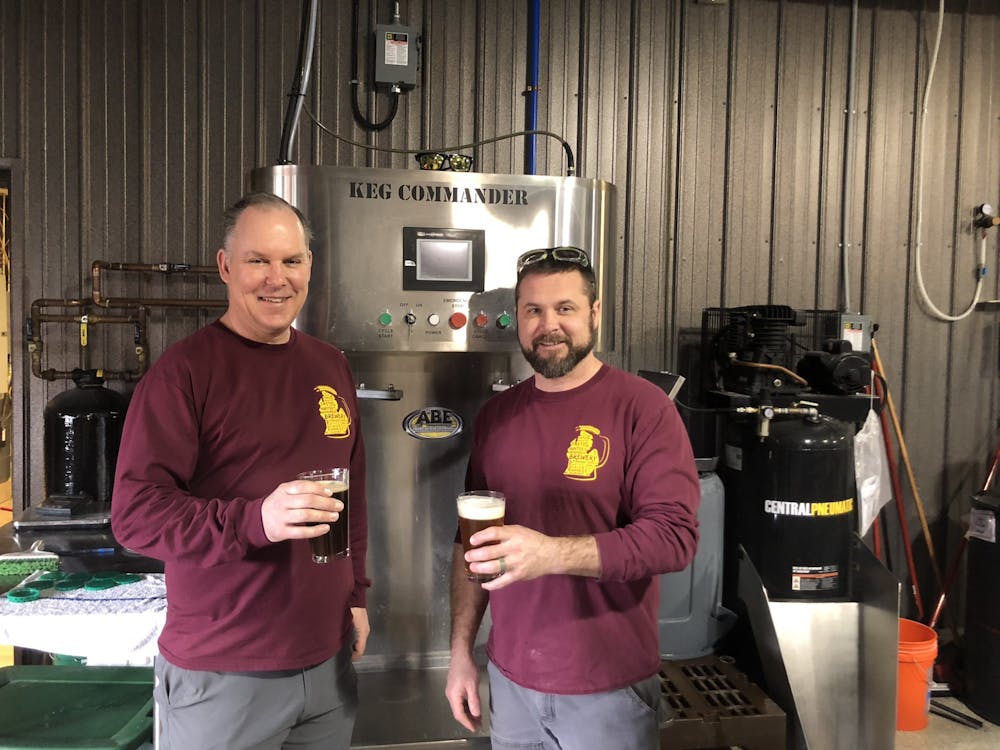CMU fermentation classes brewing success for beer-loving students

Cordell Demattei (left) and Steve Swaney (right) pose with a beer in front of the brewing equipment used in the class in Hunter's Ale House Feb. 25.
Brewing beer may not be the first thing many think of being a part of the university experience, but for some students at Central Michigan University, the two go hand-in-hand.
CMU's fermentation science program was introduced in 2015, and it was the first of its kind at any Michigan university. Cordell Demattei, the program's creator and its only professor, has been home-brewing since 1992 when he was in graduate school.
Demattei has a Ph.D. in molecular genetics and microbiology from Stony Brook University and has worked for many years as a scientist, as well as brewing for a start-up company.
CMU hired Demattei to design the program after other universities saw success with wine fermentation programs and the craft beer industry began growing in Michigan.
The program is an undergraduate certificate that has two prerequisites in introductory biology and introductory chemistry. The certificate itself can be finished in just one year: Learning the science in the fall semester, getting hands-on experience in the spring semester and completing a 200-hour internship.
“A lot of people have been offered jobs straight from those internships,” Demattei said. “We’ve had fantastic success of student placement into jobs.”
During the second semester of classes, students design their own recipes and travel to Hunter's Ale House, where they get the chance to craft their recipes alongside head brewer Steve Swaney, who was a student during the first year the program was available.
The certificate is popular among nontraditional students, many of whom attend CMU just for the course.
“I have people who come to the university just to earn certificate, not necessarily a degree,” Demattei said. Swaney was one of those students.
Swaney graduated from college for the first time in 1993 with a degree in biochemistry, making a career in pharmaceutical research with several companies around Michigan. He transitioned into semi-retirement when he moved to Mount Pleasant in 2014 and his wife got a job as a professor at CMU.
He had been home-brewing since 2007, when his brother introduced him to it, having no idea it would one day become his career. After moving to Mount Pleasant, Swaney returned to college for one year and after completing an internship in Petoskey, he had his brewing job lined up back home.
“It’s definitely a wandering path,” Swaney said about going from home-brewer to master brewer in just a few years. “At the time you just kind of take the next step.”
Hunter's Ale House was not just where he began working after finishing the course but also the place where his class learned to brew. Swaney now spends the spring months of the year helping teach the next group of classes about the practical side of brewing and serving as an example of the success that can follow from CMU's fermentation science program.
While learning the specifics of brewing in Hunter’s Ale House, students will, over the course of several weeks, create several brews.
The student-made beers are often put on tap and sold at the establishment, and are often submitted to the U.S. Open College Beer Championship, where CMU students compete against fermentation programs at colleges across the United States.
“We’ve won at least one medal every year,” Demattei said, including the double IPA Batch 100, which won a gold medal in 2017.
Several beers that began as student brews are still made and served at Hunter’s Ale House, including Sticky Orange, Cabortosser and WWJB (What Would Jesus Brew).







